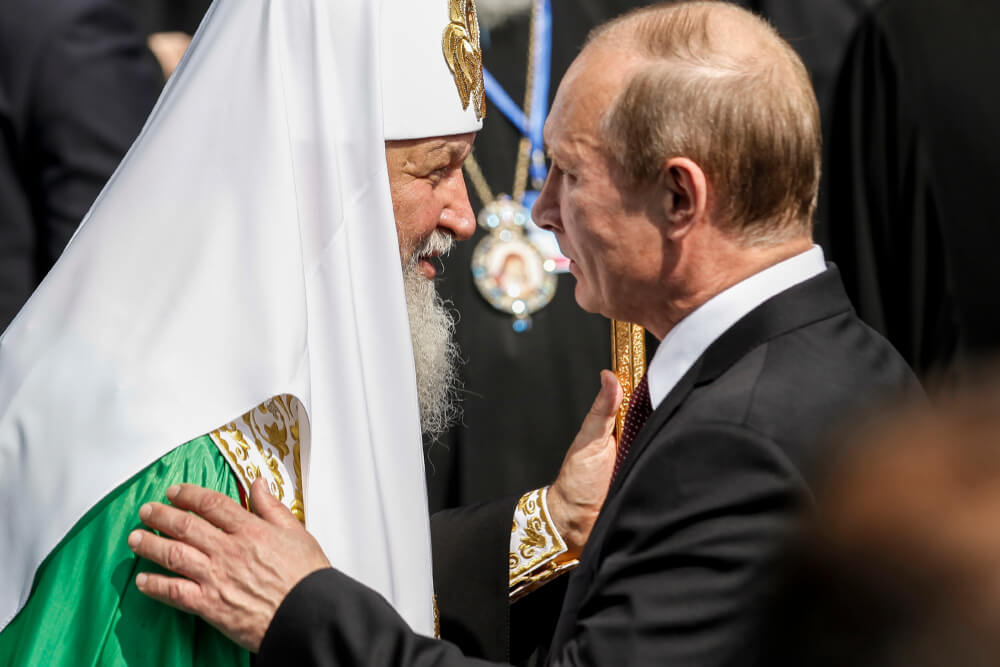On November 28, the Kremlin, via a videoconference from Vladimir Putin, addressed the plenary session of the Russian People's Council. The central topic of the forum dedicated to the 30th anniversary of the organisation's establishment was "The Present and Future of the Russian World".
The Russian People's Council was founded in 1993, and in 2005, it was granted a “special consultative status” within the UN. This status provided the organisation access to the UN Economic and Social Council and other significant UN mechanisms protecting human rights.
Russian Patriarch Kirill presided over the Russian People's Council. A variety of Russian propagandists, imperialists and radical nationalists, with a few people, such as famous Russian hockey player Vladislav Tretiak and Russian MMA champion Fedor Emelianenko, attended the Council as members of the governing committee.
Sanctioned by the US, the UK and the EU, Konstantin Malofeev, a Russian Orthodox Christian oligarch, was a deputy to Patriarch Kirill at the Russki People's Council.
Konstantin Malofeev is the person who supported the attack on Ukraine in 2014. It was a time when Russian mercenaries, without any prior warning, attacked Ukraine and attempted to seize territory in Eastern Ukraine.
Continuation of the Russian imperial agenda
By looking at the Russki People's Council and the people affiliated with it, one can clearly see that the principal agenda and purpose of the Russki People's Council is to advance the Russian imperial agenda by all available means.
Putin spoke of fairness, solidarity, progress, traditional family values and the new world order. As in the time of the Soviet Union, Russia is again committed to breaking the existing world order. This was what Putin actually told the Council members.
When Putin spoke of the Russki world, he spoke about Great Russia
When Putin spoke of the Russki world, he spoke about Great Russia, which, over the course of its history, has had different names. Putin mentioned the Moscow Kingdom, the Russian Empire, and the USSR.
Russian intentions were unclear to most people globally. The Russki People's Council originally appeared as something very Russian. It was awkward and obscurantist but original, even though it incorrectly appeared as not being dangerous.
Since Putin attacked Ukraine, Russia has stopped camouflaging its true intentions. A closer look at the influential members of the Council's board and their biographies explains whether Russia's aggressiveness will end in Ukraine. The war in Ukraine is only one amongst other ongoing initiatives by the Russki People's Council.
Since the Council was founded in 1993 and legitimised globally by the UN in 2005, it is fair to say that Russia had planned the ongoing aggression in Ukraine long before the Crimea annexation. A book by William Burns - “The Back Channel” - highlights that even Boris Yeltsin was obsessed with Russian-speaking people in the Baltic States.
By legitimising the Russki People's Council in 2005, Russia collected the so-called combat intelligence and performed preliminary activities. On that day in 2005, Russia legitimised future and long-planned atrocities.
Russia is everywhere where Russian language is used
This recent assembly of the Russki People's Council officially declared an anti-Western agenda. When Putin spoke of a new and fairer world order, he appealed to the Russian provincials who were uncomfortable in the current world and rejected the West.
At the Russki People's Council, Putin spoke of the current Donbas war. He wants Ukrainian territories, not the people of Donbas, whom he could have relocated to Russia easily instead of attacking Ukraine in 2014.
Putin’s Russia has been aggressively building up the Russki world by trying to aggregate everyone who was either subverted or occupied by Russia. On the global level, the Russki People's Council is used to set the ground for subversion or occupation.
The Russki People's Council is about finding fake legends for the Russian imperial and aggressive agenda.
 Russian Patriarch Kirill presided over the Russian People's Council. A variety of Russian propagandists, imperialists and radical nationalists attended the Council as members of the governing committee
Russian Patriarch Kirill presided over the Russian People's Council. A variety of Russian propagandists, imperialists and radical nationalists attended the Council as members of the governing committee
Russia will try to find a reason to react, perhaps using military mechanisms if at least part of the people in a country uses the Russian language for communication.
During Putin’s online appearance at the Russki People's Council, he spent his time praising and glorifying the Russian economy and said it had survived despite 2 years of Western sanctions.
He also spoke about family values and that people in Russia need to have more than 2 children. At the same time, there has been a ban on the activities of the LGBTQ movement in Russia, and its members have been exposed to persecution.
The purpose and agenda of the Russki People's Council stopped being clandestine and unclear to the West
The president also spoke about annexing new territories because the Russian people view it as justification for Russia's greatness.
The purpose and agenda of the Russki People's Council stopped being clandestine and unclear to the West. At the Russki People's Council, Putin declared that he wanted to define the new world order.
It is an order similar to today's Russia, obsessed with its greatness and power but, in fact, isolated and condemned from the most advanced part of humanity. Putin’s speech satisfied the Russian People's Council, confirming that he remained on the path of the imperial idea of Russian uniqueness, which they created and continue implementing together.